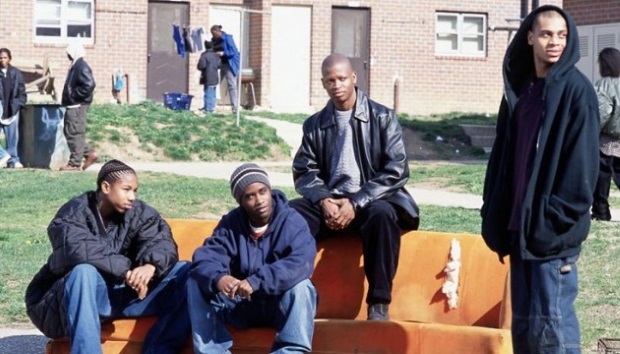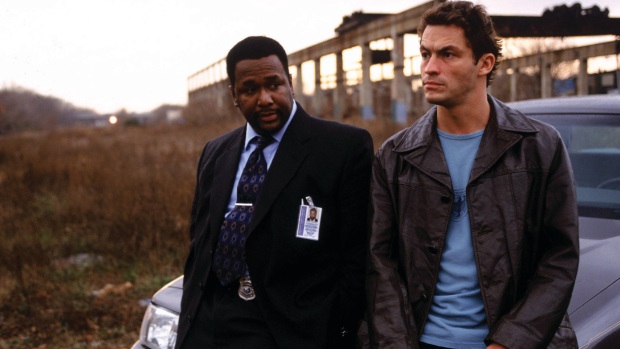The Wire: Why The Show Is Still Relevant 10 Years Later
David Simon's celebrated HBO crime drama concluded a decade ago this month, and its themes still feel depressingly pertinent...
This article comes from Den of Geek UK.
“This’ America, man.”
These were the words which opened the first episode of The Wire in 2002, and there is no better sentence to encapsulate the spirit of the entire series. Created by David Simon, a former crime reporter at the Baltimore Sun, The Wire stands not only as a landmark in serial television, but an invaluable record of American society. Now, ten years since the fifth and final season was broadcast on HBO, it remains a cultural touchstone, championed by Barack Obama as “one of the greatest – not just television shows, but pieces of art in the last couple of decades.”
Despite this acclaim, The Wire never received much attention, let alone adoration, during its initial run. Over seven years and five seasons, the show amassed only middling ratings and received no major awards. For many, the slow pace, slang-ridden dialogue and predominantly black cast rendered it impenetrable, and it passed by as just another cop show on the horizon. Why, then, has The Wire continued to find new audiences as the years have passed?
The obvious reality is that The Wire was always more than another cop show; it was a study of a modern American city, and its institutions – both lawful and criminal – which perpetuate a cycle of inequality, violence, and corruption. The power of this commentary has only heightened over the last decade, and it continues to inform and incite debates around drug policy, policing, and race relations in the United States. More than thirty universities throughout the country now offer courses on The Wire, including in sociology, literature, law, criminal justice, public health and business. Indeed, it’s an influence which has not always been welcomed in the halls of power; Martin O’Malley, the former Mayor of Baltimore, is said to hate the series “with a taut fury,” and the city’s inhabits have often criticised the show’s grim depiction of their home.

The Wire was not the only series of its day to inspire such a strong reaction. It arrived as part of a much wider movement in American television, a “Golden Age” of cable drama in which shows were characterised by a creator-driven approach and complex, serialised narratives. It was in 1997 that HBO pioneered this new style of long-form storytelling with their prison drama Oz, the first hour-long television serial produced by a premium American cable network. Two years later, the seminal crime series The Sopranos perfected the format and sparked a revolution which has paved the way for everything from Six Feet Under to Game Of Thrones, House Of Cards, and The Crown.
Although The Wire was just one of many TV dramas to appear during this period, its achievements were entirely singular. The range of themes and richness of the characters featured were unlike anything else to be found at the time, or since. In chronicling the Baltimore underworld, David Simon shone a sympathetic light onto parts of society that were typically neglected by mainstream entertainment, and the complex reality was never softened with easy answers. It was nuanced, intricate storytelling defined by shades of grey rather than binary morality, unafraid to represent America as it exists, rather than how we imagine it on cinema screens. African American people, women, queer people, drug addicts, and drug dealers were all at the forefront of this Baltimore, and they refused to abide by any of the audience’s prejudices.
Indeed, looking specifically at The Wire’s depiction of queer characters of color, it becomes clear that the film industry is still catching up with what television achieved over a decade ago. In 2016, Barry Jenkins’ Oscar winning drama Moonlight was rightly praised for its complex dissection of black male identity and sexuality, but these were themes which had been already been explored by The Wire over a decade earlier. Omar Little, the gay stick-up man brilliantly portrayed by Michael K Williams, defied all preconceived notions of what a black criminal should look like on screen. On the other side of the law, Sonja Sohn starred as Kima Greggs, a lesbian narcotics detective who deals with prejudice and personal sacrifice both at home and in the workplace. When David Simon was asked why he chose to write these characters as gay, he simply replied, “Because gay people exist.”
In this way, The Wire provided an authentically rich and varied vision of identity in modern America, with people of color represented at every level of society, from politicians, to police officers, to schoolchildren. This year, while Hollywood congratulates itself for the success of blockbuster films starring people of colour, it’s worth remembering that cable television took the same risks long before it was considered profitable.
However, to interpret The Wire solely as a study of race would be a gross simplification. Race is just one power dynamic at play in Baltimore, and the show goes to great pains to demonstrate the various social hierarchies that suffocate every industry and institution. Nowhere is this better illustrated than in a scene from season one, episode three, “The Buys.” During a three-minute sequence, drug dealer D’Angelo Barksdale attempts to explain the rules of chess to two of his underlings, likening each piece to an element of the drug trade. The King, obviously, represents the boss, Avon Barksdale, while the Queen is his quick-thinking enforcer, Stringer Bell. Likewise, the rook represents the drug stash house, whereas the pawns are the soldiers on the streets. Recognising themselves as the latter, the boys’ attention quickly moves up the hierarchy. “How do you get to be the king?” one of them asks. “It ain’t like that,” comes the reply. “The king, stay the king.”
Throughout its five seasons, The Wire moves across the breadth of Baltimore, from street corners, to the docks, to City Hall, but these same, immovable power structures define every institution. Seats of authority, whether the office of Mayor or the control of a drug empire, are granted by privilege and political convenience rather than merit or distinction. Corruption infects every echelon, leaving the lowliest police officer and the grandest union official with their hands dirtied and indebted to forces beyond their control. Meanwhile, law enforcement is hamstrung by improbable targets and budgetary limitations, as street gangs engage in an endless tug of war over blood-drenched territory. It is a system which is engineered in favour of the status quo, intended to ensure that the king will always stay the king.
Although some have argued that this is an ultimately fatalist vision, it does not suggest that change is impossible, but that if we truly wish change to come it must reach across society. The halls of government and the street corners of the West Side are intrinsically linked, and one cannot be transformed without the other. Above all, the show argues that we must rethink our assumptions about race, power and justice if we are to ever find solutions to the social issues which continue to ravage American society. Ten years on, Baltimore’s war on drugs still rages in an unending battle of attrition, and the city’s murder rate remains at an all-time high. The Wire might not have the answers to this devastation, but it suggests how we might begin to find them.

Arguably, the most visible impact of The Wire today is not its social or political repercussions, but the acting careers it launched on both the big and small screens. Hackney-born Idris Elba received acclaim for his hugely convincing turn as the wily drug lord Stringer Bell, and he has since become a regular feature of blockbusters from Prometheus to Pacific Rim to the Marvel Cinematic Universe. Meanwhile, Michael B Jordan has rapidly emerged as one of Hollywood’s most exciting lead performers, with breakout roles in Fruitvale Station, Creed and Black Panther. Only a teenager when he appeared in The Wire, Jordan was nevertheless a powerful presence as the tragically naïve drug dealer Wallace.
Outside of blockbuster films, stars of The Wire have also cropped up in more recent landmarks of television. Aiden Gillen, who played ambitious politician Tommy Carcetti from season three onwards, went on to exchange the corridors of Baltimore City Hall for those of King’s Landing. His performance as the nefarious Petyr “Littlefinger” Baelish in Game Of Thrones has launched him to new heights of stardom, and he still finds time to appear in more independent fare like the charming 2016 film Sing Street. And, of course, there’s Dominic West, The Wire’s closest thing to a protagonist as maverick detective Jimmy McNulty, who can now be found leading Showtime’s The Affair alongside Ruth Wilson.
Amid these success stories, however, there are members of The Wire’s cast who have been unable to properly capitalise on their acclaim. Michael K Williams provided the show’s most fascinating character in the form of Omar Little, and was equally remarkable as Chalky White in HBO’s Prohibition-era drama Boardwalk Empire. And yet, he has since failed to secure the leading roles he surely deserves, instead being largely limited to supporting parts and walk-on cameos in recent film mediocrities, including Robocop, Ghostbusters and Assassin’s Creed. Similarly, Clarke Peters has had a disappointing run since serving five seasons as The Wire’s Detective Lester Freamon. Highlights include blink-and-you’ll-miss-him appearances in 2014’s John Wick and this year’s Oscar hopeful, Three Billboards Outside Ebbing, Missouri, but he is more generally found straddling various TV shows (including, inexplicably, British detective dramas Death In Paradise and Midsomer Murders).
Much like the career paths of its various stars, the legacy of The Wire has been uneven. While some have praised David Simon for opening frank discussions around race and policing in modern America, others have damned him for an unfairly cynical take on a profoundly diverse and complicated city. Whatever one believes, it can’t be denied that the show has left has indelible mark on American culture and provided a benchmark against which all crime dramas must be measured. Its continuing power has been unfortunately buttressed by the fact that there are still innumerable lessons to be learned. In 2016, David Smith travelled to Baltimore and reported in the Guardian that “the toxic mix of drugs, firearms and joblessness chronicled by The Wire in 2002 still persists,” while “change is painfully uneven.”
Ten years ago, as The Wire reached its conclusion, its most optimistic viewers must have felt like the divided world it had depicted was finally coming to an end. Barack Obama, the first African-American President, had assumed power on a mandate of sweeping change and promised, above all, a single word; hope. Today, under the shadow of Freddie Gray, Black Lives Matter, Donald Trump, and so much else, The Wire still feels depressingly pertinent.
